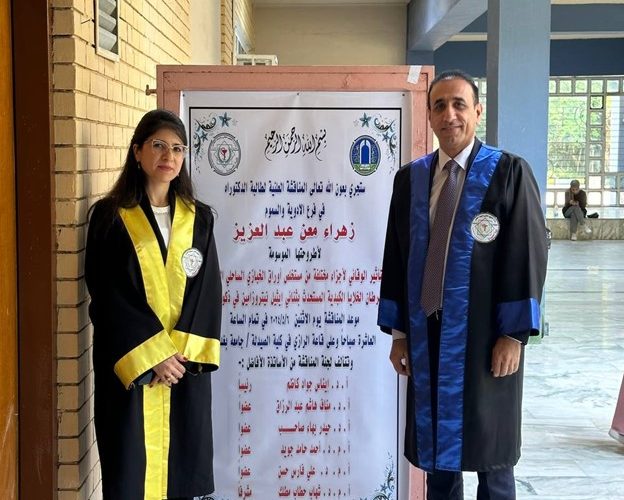The College of Pharmacy discussed the PhD dissertation entitled The Protective Effect of Different Fractions of Iraqi Hibiscus tiliaceus L. Leaves Extract on Diethylnitrosamine Induced Hepatocellular Carcinoma in Male Rats” by the student Zahraa Maan Abdul Azeez and the supervisor, Assistant Professor Dr. Shihab Hattab Mutlag, a faculty member at the Pharmacology and Toxicology Department.The study aimed to examine the preventive effects of Iraqi Hibiscus tiliaceus leaves extracts in different fractions on diethylnitrosamine-induced hepatocellular cancer in rats. The study included: 48 Wistar albino male rats were assigned to eight groups of six rats each. Group I, rats received 1ml/kg/day of distilled water orally for 24 weeks. Group II, rats got only 70 mg/kg diethylnitrosamine intraperitoneally weekly for 10 weeks for hepatocellular carcinoma induction after 24 weeks of the first dose. In Group III, rats were given 250 mg/kg of Hibiscus tiliaceus leaves ethanol extract for 24 weeks. In Group IV, 500 mg/kg of Hibiscus tiliaceus leaves ethanol extract was given for 24 weeks. In Group V, 250 mg/kg ethyl acetate fraction was given for 24 weeks. Group VI rats receive 500 mg/kg of ethyl acetate fraction for 24 weeks. Group VII, 250 mg/kg chloroform fraction given to rats for 24 weeks. Group VIII, for 24 weeks 500 mg/kg chloroform fraction was given. All treatment groups have diethylnitrosamine for hepatocellular carcinoma induction as in group II. The study concluded that Hibiscus tiliaceus leaves extract had powerful hepatoprotective, antioxidant, anti-cancer, and anti-inflammatory activities prevent diethylnitrosamine-induced hepatocellular carcinoma in rat models. The study recommended that Hibiscus tiliaceus leaves extract reveal a promising Hepatocellular carcinoma protective supplement.



